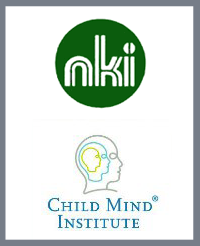Enhanced Nathan Kline Institute - Rockland Sample¶

Introduction¶
The enhanced Nathan Kline Institute-Rockland Sample (NKI-RS) is an ongoing, institutionally centered endeavor aimed at creating a large-scale (N > 1000) community sample of participants across the lifespan. Measures include a wide array of physiological and psychological assessments, genetic information, and advanced neuroimaging. Anonymized data will be publicly shared openly and prospectively (i.e., on a quarterly basis).
The National Institute of Mental Health strategic plan for advancing psychiatric neuroscience calls for increased discovery science initiatives in an effort to deliniate developmental trajectories for risk and resilience across the lifespan. Such initiatives require large, openly accessible datasets that contain sufficient detail to enable the generation and testing of multiple hypotheses. The NKI-RS is intended to help meet this need.
The NKI-RS Team¶
Special thanks to Cameron Craddock for his assistance in designing the test-retest dataset and helping to troubleshoot its various phases, as well as providing the task paradigms; to Kamil Urgurbil, Eddie Auerbach, Junquian Gordon Xu and Steen Moeller from the HCP for assistance with the implementation of the multiband sequences and reconstruction algorithms; to Satrajit Ghosh for his guidance in the development of our DICOM anonymization protocol; and as always - to Maarten Mennes for his efforts overseeing the INDI team.
Funding¶
Principal support for the enhanced NKI-RS project is provided by the NIMH BRAINS R01MH094639-01 (PI Milham). Funding for key personnel also provided in part by the New York State Office of Mental Health and Research Foundation for Mental Hygiene. Funding for the decompression and augmentation of administrative and phenotypic protocols provided by a grant from the Child Mind Institute (1FDN2012-1). Additional personnel support provided by the Center for the Developing Brain at the Child Mind Institute, as well as NIMH R01MH081218, R01MH083246, and R21MH084126. Project support also provided by the NKI Center for Advanced Brain Imaging (CABI), the Brain Research Foundation, and the Stavros Niarchos Foundation.
Funding: Real-Time Neurofeedback¶
Principal support for the Real-Time Neurofeedback project is provided by the NIMH BRAINS R01-MH101555 (PI Craddock).
Acknowledgements¶
We would like to thank Lawrence Maayan for his key role in the design and execution of the pilot NKI-RS, David Guilfoyle for his assistance with human imaging, and Raj Sangoi and Caixia Hu for the many hours contributed to scanning and providing invaluable feedback. Also, special thanks to Randy Buckner for providing us the specifications for the Brain Genomics Superstruct’s Common Acquisition Protocol, which formed the basis of the imaging protocol in the pilot phase; to Kamil Urgurbil, Eddie Auerbach, Junquian Gordon Xu, and Steen Moeller from the HCP for assistance with the implementation of the multiband sequences and reconstruction algorithms; to Satrajit Ghosh for his guidance in the development of our DICOM anonymization protocol; and to the Brain Connectivity and Cognition Laboratory for providing us with the results of their quality control check.

